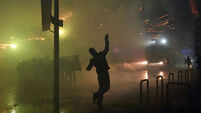Olmert defiant after calls for resignation
Israeli Prime Minister Ehud Olmert remained defiant today, hoping to beat a rising wave of calls to step down after a report criticising his handling of last year’s war with Lebanon.
His spokeswoman, Miri Eisin, today reiterated his position that “the best way to contend with the situation … is to have a stable government, not a transition period, and to immediately … fix the mistakes and face the challenges”.














